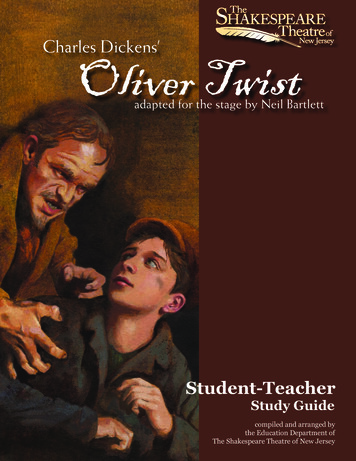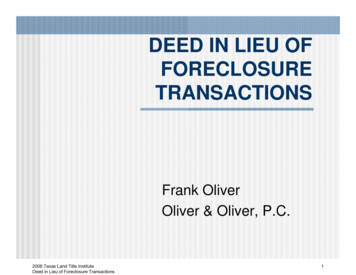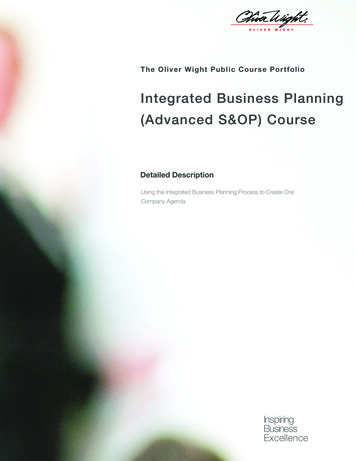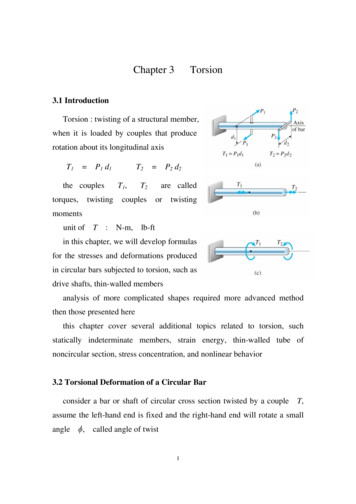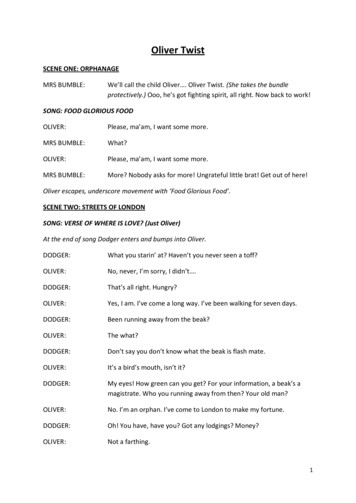
Transcription
Oliver TwistBy Charles DickensDownload free eBooks of classic literature, books andnovels at Planet eBook. Subscribe to our free eBooks blogand email newsletter.
CHAPTER ITREATS OF THE PLACEWHERE OLIVER TWISTWAS BORN AND OFTHE CIRCUMSTANCESATTENDING HIS BIRTHAmong other public buildings in a certain town, whichfor many reasons it will be prudent to refrain from mentioning, and to which I will assign no fictitious name, thereis one anciently common to most towns, great or small: towit, a workhouse; and in this workhouse was born; on a dayand date which I need not trouble myself to repeat, inasmuch as it can be of no possible consequence to the reader,in this stage of the business at all events; the item of mortality whose name is prefixed to the head of this chapter.For a long time after it was ushered into this world ofsorrow and trouble, by the parish surgeon, it remained amatter of considerable doubt whether the child would sur- Oliver Twist
vive to bear any name at all; in which case it is somewhatmore than probable that these memoirs would never haveappeared; or, if they had, that being comprised within acouple of pages, they would have possessed the inestimablemerit of being the most concise and faithful specimen of biography, extant in the literature of any age or country.Although I am not disposed to maintain that the beingborn in a workhouse, is in itself the most fortunate and enviable circumstance that can possibly befall a human being,I do mean to say that in this particular instance, it was thebest thing for Oliver Twist that could by possibility have occurred. The fact is, that there was considerable difficulty ininducing Oliver to take upon himself the office of respiration,—a troublesome practice, but one which custom hasrendered necessary to our easy existence; and for some timehe lay gasping on a little flock mattress, rather unequallypoised between this world and the next: the balance being decidedly in favour of the latter. Now, if, during thisbrief period, Oliver had been surrounded by careful grandmothers, anxious aunts, experienced nurses, and doctorsof profound wisdom, he would most inevitably and indubitably have been killed in no time. There being nobody by,however, but a pauper old woman, who was rendered rathermisty by an unwonted allowance of beer; and a parish surgeon who did such matters by contract; Oliver and Naturefought out the point between them. The result was, that, after a few struggles, Oliver breathed, sneezed, and proceededto advertise to the inmates of the workhouse the fact of anew burden having been imposed upon the parish, by setFree eBooks at Planet eBook.com
ting up as loud a cry as could reasonably have been expectedfrom a male infant who had not been possessed of that veryuseful appendage, a voice, for a much longer space of timethan three minutes and a quarter.As Oliver gave this first proof of the free and properaction of his lungs, the patchwork coverlet which was carelessly flung over the iron bedstead, rustled; the pale face ofa young woman was raised feebly from the pillow; and afaint voice imperfectly articulated the words, ‘Let me seethe child, and die.’The surgeon had been sitting with his face turned towards the fire: giving the palms of his hands a warm anda rub alternately. As the young woman spoke, he rose, andadvancing to the bed’s head, said, with more kindness thanmight have been expected of him:‘Oh, you must not talk about dying yet.’‘Lor bless her dear heart, no!’ interposed the nurse, hastily depositing in her pocket a green glass bottle, the contentsof which she had been tasting in a corner with evident satisfaction.‘Lor bless her dear heart, when she has lived as long asI have, sir, and had thirteen children of her own, and allon ‘em dead except two, and them in the wurkus with me,she’ll know better than to take on in that way, bless her dearheart! Think what it is to be a mother, there’s a dear younglamb do.’Apparently this consolatory perspective of a mother’sprospects failed in producing its due effect. The patientshook her head, and stretched out her hand towards the Oliver Twist
child.The surgeon deposited it in her arms. She imprintedher cold white lips passionately on its forehead; passed herhands over her face; gazed wildly round; shuddered; fellback—and died. They chafed her breast, hands, and temples; but the blood had stopped forever. They talked of hopeand comfort. They had been strangers too long.‘It’s all over, Mrs. Thingummy!’ said the surgeon at last.‘Ah, poor dear, so it is!’ said the nurse, picking up thecork of the green bottle, which had fallen out on the pillow,as she stooped to take up the child. ‘Poor dear!’‘You needn’t mind sending up to me, if the child cries,nurse,’ said the surgeon, putting on his gloves with great deliberation. ‘It’s very likely it WILL be troublesome. Give it alittle gruel if it is.’ He put on his hat, and, pausing by the bedside on his way to the door, added, ‘She was a good-lookinggirl, too; where did she come from?’‘She was brought here last night,’ replied the old woman,‘by the overseer’s order. She was found lying in the street.She had walked some distance, for her shoes were worn topieces; but where she came from, or where she was going to,nobody knows.’The surgeon leaned over the body, and raised the lefthand. ‘The old story,’ he said, shaking his head: ‘no wedding-ring, I see. Ah! Good-night!’The medical gentleman walked away to dinner; and thenurse, having once more applied herself to the green bottle,sat down on a low chair before the fire, and proceeded todress the infant.Free eBooks at Planet eBook.com
What an excellent example of the power of dress, youngOliver Twist was! Wrapped in the blanket which had hitherto formed his only covering, he might have been the childof a nobleman or a beggar; it would have been hard for thehaughtiest stranger to have assigned him his proper stationin society. But now that he was enveloped in the old calico robes which had grown yellow in the same service, hewas badged and ticketed, and fell into his place at once—a parish child—the orphan of a workhouse—the humble,half-starved drudge—to be cuffed and buffeted through theworld—despised by all, and pitied by none.Oliver cried lustily. If he could have known that he wasan orphan, left to the tender mercies of church-wardens andoverseers, perhaps he would have cried the louder. Oliver Twist
CHAPTER IITREATS OF OLIVERTWIST’S GROWTH,EDUCATION, AND BOARDFor the next eight or ten months, Oliver was the victimof a systematic course of treachery and deception. Hewas brought up by hand. The hungry and destitute situationof the infant orphan was duly reported by the workhouseauthorities to the parish authorities. The parish authorities inquired with dignity of the workhouse authorities,whether there was no female then domiciled in ‘the house’who was in a situation to impart to Oliver Twist, the consolation and nourishment of which he stood in need. Theworkhouse authorities replied with humility, that therewas not. Upon this, the parish authorities magnanimouslyand humanely resolved, that Oliver should be ‘farmed,’ or,in other words, that he should be dispatched to a branchworkhouse some three miles off, where twenty or thirtyother juvenile offenders against the poor-laws, rolled aboutthe floor all day, without the inconvenience of too muchFree eBooks at Planet eBook.com
food or too much clothing, under the parental superintendence of an elderly female, who received the culprits at andfor the consideration of sevenpence-halfpenny per smallhead per week. Sevenpence-halfpenny’s worth per week isa good round diet for a child; a great deal may be got forsevenpence-halfpenny, quite enough to overload its stomach, and make it uncomfortable. The elderly female was awoman of wisdom and experience; she knew what was goodfor children; and she had a very accurate perception of whatwas good for herself. So, she appropriated the greater part ofthe weekly stipend to her own use, and consigned the risingparochial generation to even a shorter allowance than wasoriginally provided for them. Thereby finding in the lowestdepth a deeper still; and proving herself a very great experimental philosopher.Everybody knows the story of another experimental philosopher who had a great theory about a horse being ableto live without eating, and who demonstrated it so well,that he had got his own horse down to a straw a day, andwould unquestionably have rendered him a very spiritedand rampacious animal on nothing at all, if he had not died,four-and-twenty hours before he was to have had his firstcomfortable bait of air. Unfortunately for, the experimenalphilosophy of the female to whose protecting care OliverTwist was delivered over, a similar result usually attendedthe operation of HER system; for at the very moment whenthe child had contrived to exist upon the smallest possibleportion of the weakest possible food, it did perversely happen in eight and a half cases out of ten, either that it sickened Oliver Twist
from want and cold, or fell into the fire from neglect, or gothalf-smothered by accident; in any one of which cases, themiserable little being was usually summoned into anotherworld, and there gathered to the fathers it had never knownin this.Occasionally, when there was some more than usuallyinteresting inquest upon a parish child who had been overlooked in turning up a bedstead, or inadvertently scaldedto death when there happened to be a washing—thoughthe latter accident was very scarce, anything approachingto a washing being of rare occurance in the farm—the jurywould take it into their heads to ask troublesome questions,or the parishioners would rebelliously affix their signaturesto a remonstrance. But these impertinences were speedilychecked by the evidence of the surgeon, and the testimonyof the beadle; the former of whom had always opened thebody and found nothing inside (which was very probableindeed), and the latter of whom invariably swore whateverthe parish wanted; which was very self-devotional. Besides,the board made periodical pilgrimages to the farm, and always sent the beadle the day before, to say they were going.The children were neat and clean to behold, when THEYwent; and what more would the people have!It cannot be expected that this system of farming wouldproduce any very extraordinary or luxuriant crop. Oliver Twist’s ninth birthday found him a pale thin child,somewhat diminutive in stature, and decidely small in circumference. But nature or inheritance had implanted a goodsturdy spirit in Oliver’s breast. It had had plenty of room toFree eBooks at Planet eBook.com
expand, thanks to the spare diet of the establishment; andperhaps to this circumstance may be attributed his havingany ninth birth-day at all. Be this as it may, however, it washis ninth birthday; and he was keeping it in the coal-cellarwith a select party of two other young gentleman, who, after participating with him in a sound thrashing, had beenlocked up for atrociously presuming to be hungry, whenMrs. Mann, the good lady of the house, was unexpectedlystartled by the apparition of Mr. Bumble, the beadle, striving to undo the wicket of the garden-gate.‘Goodness gracious! Is that you, Mr. Bumble, sir?’ saidMrs. Mann, thrusting her head out of the window in wellaffected ecstasies of joy. ‘(Susan, take Oliver and them twobrats upstairs, and wash ‘em directly.)—My heart alive! Mr.Bumble, how glad I am to see you, sure-ly!’Now, Mr. Bumble was a fat man, and a choleric; so, instead of responding to this open-hearted salutation in akindred spirit, he gave the little wicket a tremendous shake,and then bestowed upon it a kick which could have emanated from no leg but a beadle’s.‘Lor, only think,’ said Mrs. Mann, running out,—for thethree boys had been removed by this time,—‘only think ofthat! That I should have forgotten that the gate was boltedon the inside, on account of them dear children! Walk insir; walk in, pray, Mr. Bumble, do, sir.’Although this invitation was accompanied with a curtsey that might have softened the heart of a church-warden,it by no means mollified the beadle.‘Do you think this respectful or proper conduct, Mrs.10Oliver Twist
Mann,’ inquired Mr. Bumble, grasping his cane, ‘to keepthe parish officers a waiting at your garden-gate, when theycome here upon porochial business with the porochial orphans? Are you aweer, Mrs. Mann, that you are, as I may say,a porochial delegate, and a stipendiary?’‘I’m sure Mr. Bumble, that I was only a telling one or twoof the dear children as is so fond of you, that it was you acoming,’ replied Mrs. Mann with great humility.Mr. Bumble had a great idea of his oratorical powers andhis importance. He had displayed the one, and vindicatedthe other. He relaxed.‘Well, well, Mrs. Mann,’ he replied in a calmer tone; ‘itmay be as you say; it may be. Lead the way in, Mrs. Mann,for I come on business, and have something to say.’Mrs. Mann ushered the beadle into a small parlour witha brick floor; placed a seat for him; and officiously depositedhis cocked hat and can on the table before him. Mr. Bumblewiped from his forehead the perspiration which his walkhad engendered, glanced complacently at the cocked hat,and smiled. Yes, he smiled. Beadles are but men: and Mr.Bumble smiled.‘Now don’t you be offended at what I’m a going to say,’observed Mrs. Mann, with captivating sweetness. ‘You’vehad a long walk, you know, or I wouldn’t mention it. Now,will you take a little drop of somethink, Mr. Bumble?’‘Not a drop. Nor a drop,’ said Mr. Bumble, waving hisright hand in a dignified, but placid manner.‘I think you will,’ said Mrs. Mann, who had noticed thetone of the refusal, and the gesture that had accompaniedFree eBooks at Planet eBook.com11
it. ‘Just a leetle drop, with a little cold water, and a lump ofsugar.’Mr. Bumble coughed.‘Now, just a leetle drop,’ said Mrs. Mann persuasively.‘What is it?’ inquired the beadle.‘Why, it’s what I’m obliged to keep a little of in the house,to put into the blessed infants’ Daffy, when they ain’t well,Mr. Bumble,’ replied Mrs. Mann as she opened a cornercupboard, and took down a bottle and glass. ‘It’s gin. I’llnot deceive you, Mr. B. It’s gin.’‘Do you give the children Daffy, Mrs. Mann?’ inquiredBumble, following with this eyes the interesting process ofmixing.‘Ah, bless ‘em, that I do, dear as it is,’ replied the nurse. ‘Icouldn’t see ‘em suffer before my very eyes, you know sir.’‘No’; said Mr. Bumble approvingly; ‘no, you could not.You are a humane woman, Mrs. Mann.’ (Here she set downthe glass.) ‘I shall take a early opportunity of mentioning itto the board, Mrs. Mann.’ (He drew it towards him.) ‘Youfeel as a mother, Mrs. Mann.’ (He stirred the gin-and-water.) ‘I—I drink your health with cheerfulness, Mrs. Mann’;and he swallowed half of it.‘And now about business,’ said the beadle, taking out aleathern pocket-book. ‘The child that was half-baptized Oliver Twist, is nine year old to-day.;‘Bless him!’ interposed Mrs. Mann, inflaming her left eyewith the corner of her apron.‘And notwithstanding a offered reward of ten pound,which was afterwards increased to twenty pound. Notwith12Oliver Twist
standing the most superlative, and, I may say, supernat’ralexertions on the part of this parish,’ said Bumble, ‘we havenever been able to discover who is his father, or what washis mother’s settlement, name, or con—dition.’Mrs Mann raised her hands in astonishment; but added, after a moment’s reflection, ‘How comes he to have anyname at all, then?’The beadle drew himself up with great pride, and said, ‘Iinwented it.’‘You, Mr. Bumble!’‘I, Mrs. Mann. We name our fondlings in alphabeticalorder. The last was a S,—Swubble, I named him. This was aT,—Twist, I named HIM. The next one comes will be Unwin,and the next Vilkins. I have got names ready made to theend of the alphabet, and all the way through it again, whenwe come to Z.’‘Why, you’re quite a literary character, sir!’ said Mrs.Mann.‘Well, well,’ said the beadle, evidently gratified with thecompliment; ‘perhaps I may be. Perhaps I may be, Mrs.Mann.’ He finished the gin-and-water, and added, ‘Oliverbeing now too old to remain here, the board have determined to have him back into the house. I have come outmyself to take him there. So let me see him at once.’‘I’ll fetch him directly,’ said Mrs. Mann, leaving the roomfor that purpose. Oliver, having had by this time as much ofthe outer coat of dirt which encrusted his face and hands,removed, as could be scrubbed off in one washing, was ledinto the room by his benevolent protectress.Free eBooks at Planet eBook.com13
‘Make a bow to the gentleman, Oliver,’ said Mrs. Mann.Oliver made a bow, which was divided between the beadle on the chair, and the cocked hat on the table.‘Will you go along with me, Oliver?’ said Mr. Bumble, ina majestic voice.Oliver was about to say that he would go along withanybody with great readiness, when, glancing upward, hecaught sight of Mrs. Mann, who had got behind the beadle’schair, and was shaking her fist at him with a furious countenance. He took the hint at once, for the fist had been toooften impressed upon his body not to be deeply impressedupon his recollection.‘Will she go with me?’ inquired poor Oliver.‘No, she can’t,’ replied Mr. Bumble. ‘But she’ll come andsee you sometimes.’This was no very great consolation to the child. Youngas he was, however, he had sense enough to make a feintof feeling great regret at going away. It was no very difficult matter for the boy to call tears into his eyes. Hungerand recent ill-usage are great assistants if you want to cry;and Oliver cried very naturally indeed. Mrs. Mann gavehim a thousand embraces, and what Oliver wanted a greatdeal more, a piece of bread and butter, less he should seemtoo hungry when he got to the workhouse. With the sliceof bread in his hand, and the little brown-cloth parish capon his head, Oliver was then led away by Mr. Bumble fromthe wretched home where one kind word or look had neverlighted the gloom of his infant years. And yet he burst intoan agony of childish grief, as the cottage-gate closed after14Oliver Twist
him. Wretched as were the little companions in misery hewas leaving behind, they were the only friends he had everknown; and a sense of his loneliness in the great wide world,sank into the child’s heart for the first time.Mr. Bumble walked on with long strides; little Oliver,firmly grasping his gold-laced cuff, trotted beside him, inquiring at the end of every quarter of a mile whether theywere ‘nearly there.’ To these interrogations Mr. Bumble returned very brief and snappish replies; for the temporaryblandness which gin-and-water awakens in some bosomshad by this time evaporated; and he was once again a beadle.Oliver had not been within the walls of the workhouse aquarter of an hour, and had scarcely completed the demolition of a second slice of bread, when Mr. Bumble, who hadhanded him over to the care of an old woman, returned;and, telling him it was a board night, informed him that theboard had said he was to appear before it forthwith.Not having a very clearly defined notion of what a liveboard was, Oliver was rather astounded by this intelligence,and was not quite certain whether he ought to laugh or cry.He had no time to think about the matter, however; for Mr.Bumble gave him a tap on the head, with his cane, to wakehim up: and another on the back to make him lively: andbidding him to follow, conducted him into a large whitewashed room, where eight or ten fat gentlemen were sittinground a table. At the top of the table, seated in an arm-chairrather higher than the rest, was a particularly fat gentlemanwith a very round, red face.Free eBooks at Planet eBook.com15
‘Bow to the board,’ said Bumble. Oliver brushed awaytwo or three tears that were lingering in his eyes; and seeingno board but the table, fortunately bowed to that.‘What’s your name, boy?’ said the gentleman in the highchair.Oliver was frightened at the sight of so many gentlemen,which made him tremble: and the beadle gave him anothertap behind, which made him cry. These two causes madehim answer in a very low and hesitating voice; whereupona gentleman in a white waistcoat said he was a fool. Whichwas a capital way of raising his spirits, and putting himquite at his ease.‘Boy,’ said the gentleman in the high chair, ‘listen to me.You know you’re an orphan, I suppose?’‘What’s that, sir?’ inquired poor Oliver.‘The boy IS a fool—I thought he was,’ said the gentlemanin the white waistcoat.‘Hush!’ said the gentleman who had spoken first. ‘Youknow you’ve got no father or mother, and that you werebrought up by the parish, don’t you?’‘Yes, sir,’ replied Oliver, weeping bitterly.‘What are you crying for?’ inquired the gentleman in thewhite waistcoat. And to be sure it was very extraordinary.What COULD the boy be crying for?‘I hope you say your prayers every night,’ said anothergentleman in a gruff voice; ‘and pray for the people whofeed you, and take care of you—like a Christian.’‘Yes, sir,’ stammered the boy. The gentleman who spokelast was unconsciously right. It would have been very like a16Oliver Twist
Christian, and a marvellously good Christian too, if Oliverhad prayed for the people who fed and took care of HIM.But he hadn’t, because nobody had taught him.‘Well! You have come here to be educated, and taughta useful trade,’ said the red-faced gentleman in the highchair.‘So you’ll begin to pick oakum to-morrow morning at sixo’clock,’ added the surly one in the white waistcoat.For the combination of both these blessings in the onesimple process of picking oakum, Oliver bowed low by thedirection of the beadle, and was then hurried away to alarge ward; where, on a rough, hard bed, he sobbed himselfto sleep. What a novel illustration of the tender laws of England! They let the paupers go to sleep!Poor Oliver! He little thought, as he lay sleeping in happy unconsciousness of all around him, that the board hadthat very day arrived at a decision which would exercise themost material influence over all his future fortunes. Butthey had. And this was it:The members of this board were very sage, deep, philosophical men; and when they came to turn their attentionto the workhouse, they found out at once, what ordinaryfolks would nver have discovered—the poor people liked it!It was a regular place of public entertainment for the poorerclasses; a tavern where there was nothing to pay; a public breakfast, dinner, tea, and supper all the year round; abrick and mortar elysium, where it was all play and no work.‘Oho!’ said the board, looking very knowing; ‘we are the fellows to set this to rights; we’ll stop it all, in no time.’ So,Free eBooks at Planet eBook.com17
they established the rule, that all poor people should havethe alternative (for they would compel nobody, not they),of being starved by a gradual process in the house, or bya quick one out of it. With this view, they contracted withthe water-works to lay on an unlimited supply of water; andwith a corn-factor to supply periodically small quantities ofoatmeal; and issued three meals of thin gruel a day, with anonion twice a week, and half a roll of Sundays. They madea great many other wise and humane regulations, havingreference to the ladies, which it is not necessary to repeat;kindly undertook to divorce poor married people, in consequence of the great expense of a suit in Doctors’ Commons;and, instead of compelling a man to support his family, asthey had theretofore done, took his family away from him,and made him a bachelor! There is no saying how many applicants for relief, under these last two heads, might havestarted up in all classes of society, if it had not been coupledwith the workhouse; but the board were long-headed men,and had provided for this difficulty. The relief was inseparable from the workhouse and the gruel; and that frightenedpeople.For the first six months after Oliver Twist was removed,the system was in full operation. It was rather expensive atfirst, in consequence of the increase in the undertaker’s bill,and the necessity of taking in the clothes of all the paupers,which fluttered loosely on their wasted, shrunken forms,after a week or two’s gruel. But the number of workhouseinmates got thin as well as the paupers; and the board werein ecstasies.18Oliver Twist
The room in which the boys were fed, was a large stonehall, with a copper at one end: out of which the master,dressed in an apron for the purpose, and assisted by one ortwo women, ladled the gruel at mealtimes. Of this festivecomposition each boy had one porringer, and no more—except on occasions of great public rejoicing, when he had twoounces and a quarter of bread besides.The bowls never wanted washing. The boys polishedthem with their spoons till they shone again; and whenthey had performed this operation (which never took verylong, the spoons being nearly as large as the bowls), theywould sit staring at the copper, with such eager eyes, as ifthey could have devoured the very bricks of which it wascomposed; employing themselves, meanwhile, in suckingtheir fingers most assiduously, with the view of catching upany stray splashes of gruel that might have been cast thereon. Boys have generally excellent appetites. Oliver Twistand his companions suffered the tortures of slow starvationfor three months: at last they got so voracious and wild withhunger, that one boy, who was tall for his age, and hadn’tbeen used to that sort of thing (for his father had kept asmall cook-shop), hinted darkly to his companions, thatunless he had another basin of gruel per diem, he was afraidhe might some night happen to eat the boy who slept nexthim, who happened to be a weakly youth of tender age. Hehad a wild, hungry eye; and they implicitly believed him. Acouncil was held; lots were cast who should walk up to themaster after supper that evening, and ask for more; and itfell to Oliver Twist.Free eBooks at Planet eBook.com19
The evening arrived; the boys took their places. The master, in his cook’s uniform, stationed himself at the copper;his pauper assistants ranged themselves behind him; thegruel was served out; and a long grace was said over theshort commons. The gruel disappeared; the boys whisperedeach other, and winked at Oliver; while his next neighboursnudged him. Child as he was, he was desperate with hunger, and reckless with misery. He rose from the table; andadvancing to the master, basin and spoon in hand, said:somewhat alarmed at his own temerity:‘Please, sir, I want some more.’The master was a fat, healthy man; but he turned verypale. He gazed in stupified astonishment on the small rebelfor some seconds, and then clung for support to the copper. The assistants were paralysed with wonder; the boyswith fear.‘What!’ said the master at length, in a faint voice.‘Please, sir,’ replied Oliver, ‘I want some more.’The master aimed a blow at Oliver’s head with the ladle;pinioned him in his arm; and shrieked aloud for the beadle.The board were sitting in solemn conclave, when Mr.Bumble rushed into the room in great excitement, and addressing the gentleman in the high chair, said,‘Mr. Limbkins, I beg your pardon, sir! Oliver Twist hasasked for more!’There was a general start. Horror was depicted on everycountenance.‘For MORE!’ said Mr. Limbkins. ‘Compose yourself,20Oliver Twist
Bumble, and answer me distinctly. Do I understand that heasked for more, after he had eaten the supper allotted by thedietary?’‘He did, sir,’ replied Bumble.‘That boy will be hung,’ said the gentleman in the whitewaistcoat. ‘I know that boy will be hung.’Nobody controverted the prophetic gentleman’s opinion.An animated discussion took place. Oliver was ordered intoinstant confinement; and a bill was next morning pasted onthe outside of the gate, offering a reward of five pounds toanybody who would take Oliver Twist off the hands of theparish. In other words, five pounds and Oliver Twist wereoffered to any man or woman who wanted an apprentice toany trade, business, or calling.‘I never was more convinced of anything in my life,’ saidthe gentleman in the white waistcoat, as he knocked at thegate and read the bill next morning: ‘I never was more convinced of anything in my life, than I am that that boy willcome to be hung.’As I purpose to show in the sequel whether the whitewaistcoated gentleman was right or not, I should perhapsmar the interest of this narrative (supposing it to possessany at all), if I ventured to hint just yet, whether the life ofOliver Twist had this violent termination or no.Free eBooks at Planet eBook.com21
CHAPTER IIIRELATES HOW OLIVERTWIST WAS VERY NEARGETTING A PLACE WHICHWOULD NOT HAVEBEEN A SINECUREFor a week after the commission of the impious and profane offence of asking for more, Oliver remained a closeprisoner in the dark and solitary room to which he had beenconsigned by the wisdom and mercy of the board. It appears,at first sight not unreasonable to suppose, that, if he had entertained a becoming feeling of respect for the prediction ofthe gentleman in the white waistcoat, he would have established that sage individual’s prophetic character, once andfor ever, by tying one end of his pocket-handkerchief to ahook in the wall, and attaching himself to the other. To theperformance of this feat, however, there was one obstacle:namely, that pocket-handkerchiefs being decided articles22Oliver Twist
of luxury, had been, for all future times and ages, removedfrom the noses of paupers by the express order of the board,in council assembled: solemnly given and pronounced under their hands and seals. There was a still greater obstaclein Oliver’s youth and childishness. He only cried bitterly allday; and, when the long, dismal night came on, spread hislittle hands before his eyes to shut out the darkness, andcrouching in the corner, t
Download free eBooks of classic literature, books and novels at Planet eBook. Subscribe to our free eBooks blog and email newsletter. Oliver Twist By Charles Dickens Oliver Twist . Free eBooks at Planet eBook.com from want and cold, or fell into the fire from neglect, or got half-smothered by accident; in any one of which cases, the
